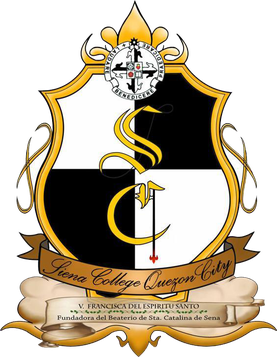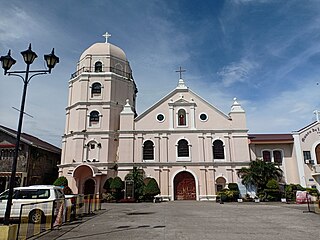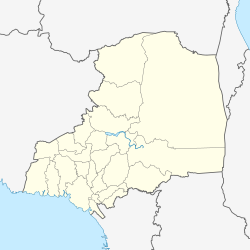
The Colegio de San Juan de Letran, also referred to by its acronym CSJL, is a private Catholic coeducational basic and higher education institution owned and run by the friars of the Order of Preachers in Intramuros, Manila, Philippines. It was founded in 1620. Colegio de San Juan de Letran has the distinction of being the oldest college in the Philippines and the oldest secondary institution in Asia. The school has produced Philippine presidents, revolutionary heroes, poets, legislators, members of the clergy, jurists, and it is also one of the only Philippine schools that has produced several Catholic saints who lived and studied on its campus. The school's patron saint is St. John the Baptist. The campus contains two statues, representing the two foremost alumni in the fields of secular and religious service: former Philippine President Manuel L. Quezon and Vietnamese Saint Vicente Liem de la Paz.

Obando, officially the Municipality of Obando, is a municipality in the province of Bulacan, Philippines. According to the 2020 census, it has a population of 59,978 people.

Paschal Baylón was a Spanish Roman Catholic lay professed religious of the Order of Friars Minor. He served as a shepherd alongside his father in his childhood and adolescence, but desired to enter the religious life. He was refused once but later was admitted as a Franciscan lay brother and became noted for his strict austerities, as well as his love for and compassion towards the sick. He was sent to Paris, France; on the way he encountered Calvinists and was nearly killed by a mob. He was best known for his strong and deep devotion to the Eucharist.

Siena College of Quezon City is a private, sectarian, non-stock basic and higher education institution run by the Congregation of the Dominican Sisters of St. Catherine of Siena in San Francisco del Monte, Quezon City, Philippines. It was established in 1959 by the Siena Sisters. The school offers tertiary education with degrees in Tourism, Business Administration, Hotel and Restaurant Management, Mass Communications, and Religious Education. It also offers pre-school, elementary, secondary education, and SPED.

The Obando Fertility Rites are a dance ritual, Anitist in origin, that later became a Catholic festival celebrated every May in Obando, Bulacan, Philippines. Locals and pilgrims, sometimes dressed in traditional costume, dance and sing in the town's streets to honour and beseech Obando's three patron saints: San Pascual, Santa Clara and Nuestra Señora de Salambáo.

The Congregation of the Religious of the Virgin Mary (Spanish: Religiosas de la Beata Virgen María, abbreviated RVM, is a Catholic centralized religious institute of consecrated life of Pontifical Right for women founded in Manila in 1684 by the Filipina Venerable Mother Ignacia del Espíritu Santo.

Our Lady of Salambáo is a Catholic title of the Blessed Virgin Mary venerated in Obando, Bulacan, Philippines. The Virgin Mary under this title is venerated as the local patroness of fishing, owing to the image's discovery in a salambáw, a type of big fishing net supported by bamboo crosspieces and mounted on a raft.

St. Mary's College Inc., also referred to by its acronym SMCQC or as St. Mary's College, is a private Catholic basic and higher education institution for both boys and girls administered by the Religious of the Virgin Mary in Mother Ignacia Avenue, Quezon City, Philippines. It was established in 1725 by the RVM Sisters.

La Consolación College Manila is a private Catholic basic and higher education institution run by the Augustinian Sisters of Our Lady of Consolation (ASOLC) in the City of Manila, Philippines. It was founded by the Augustinian Sisters in 1902 when the Apostolic Nuncio to the Philippines offered ten Filipino nuns from the Augustinian Sisters of Our Lady of Consolation a house near the Basilica of San Sebastián.

The Colegio del Sagrado Corazon de Jesus, translated in English as College of the Sacred Heart of Jesus, is a private, Catholic, and co-educational institution of learning owned and administered by the Daughters of Charity of St. Vincent de Paul on General Hughes St. Iloilo City, Philippines.

St. Mary's College of Meycauayan is a Catholic school in Meycauayan, Bulacan, Philippines. It is administered by the Religious of the Virgin Mary. It was formerly called Escuela Catolica de Meycauayan, and was founded in 1916. It provides Preparatory, Primary, Secondary, and Tertiary education.

La Consolacion College Bacolod, also referred to by its acronym LCCB or simply LCC, is a private, Catholic, co-educational basic and higher education institution administered by the Augustinian Sisters of Our Lady of Consolation (ASOLC) in Bacolod, Negros Occidental, Philippines.
Colegio de la Inmaculada Concepción - Cebu, also known by its acronym CIC, is a private Catholic basic education institution operated by the Sisters of Charity of Saint Vincent De Paul in Cebu City, Philippines. It began operation on May 30, 1880, in its Cebu City campus and originally was an all-girls school, making it the first school for girls in Cebu. It started to accept boys in 2010 making it co-educational.

St. Michael’s College is a Catholic institution of learning in Iligan, Philippines administered by the Religious of the Virgin Mary (RVM) Sisters offering four levels of education: elementary, secondary, tertiary and graduate school. It is distinguished as the oldest Catholic institution in the provinces of Lanao del Sur and Lanao del Norte.

The San Pascual Baylón Parish and National Shrine of Nuestra Señora de la Immaculada Concepcion de Salambao, commonly known as Obando Church, is a Roman Catholic church located in the municipality of Obando in the province of Bulacan, Philippines. It is under the jurisdiction of the Diocese of Malolos.

Saint Paul University, also referred to by its acronym SPUD or SPU Dumaguete, is a private Roman Catholic research non-profit coeducational basic and higher education institution run by the Sisters of St. Paul of Chartres in Dumaguete, Philippines. It was founded by the Paulinian Sisters on October 29, 1904.

St. Mary's College of Baliuag is a private, Catholic Co-educational basic and higher education institution administered by the Religious of the Virgin Mary in Baliwag, Philippines. It was formerly named Colegio de la Sagrada Familia or Holy Family School, when founded in 1912. On June 30, 1959, the Holy Family School was renamed St. Mary's Academy (SMA). It provides Preparatory, Primary, Secondary, and Tertiary education. It is the only Catholic school in the town of Baliuag, Bulacan.
Notre Dame – RVM College of Cotabato is a private, Catholic basic and higher education institution run by the Congregation of the Religious of the Virgin Mary in Cotabato City, Maguindanao, Philippines. It was established by the RVM Sisters in 1904. Notre Dame - RVM College is a member of the Notre Dame Educational Association, a group of schools named Notre Dame in the Philippines under the patronage of the Blessed Virgin Mary. Alumni and students of the institution are often called as RVMians or Marians.
Saint Paul College of Ilocos Sur, also referred to by its acronym SPCIS or SPC Ilocos Sur, is a private Catholic basic and higher education institution run by the Sisters of St. Paul of Chartres (SPC) in Bayubay, San Vicente, Ilocos Sur. It is the second oldest private school in Ilocos Sur, Philippines and is a member school of the St. Paul University System. It was founded by the Sisters of St. Paul of Chartres in 1905, thus the second oldest school in the St. Paul University System and one of the seven campuses comprising the system as well.

Santa Catalina College is a Roman Catholic, private institution that serves coeducational basic and higher education administered by the Congregation of the Dominican Sisters of St. Catherine of Siena, a religious congregation affiliated with the Dominican Order located in Sampaloc, Manila. It was originally established by the Siena Sisters in 1706.























